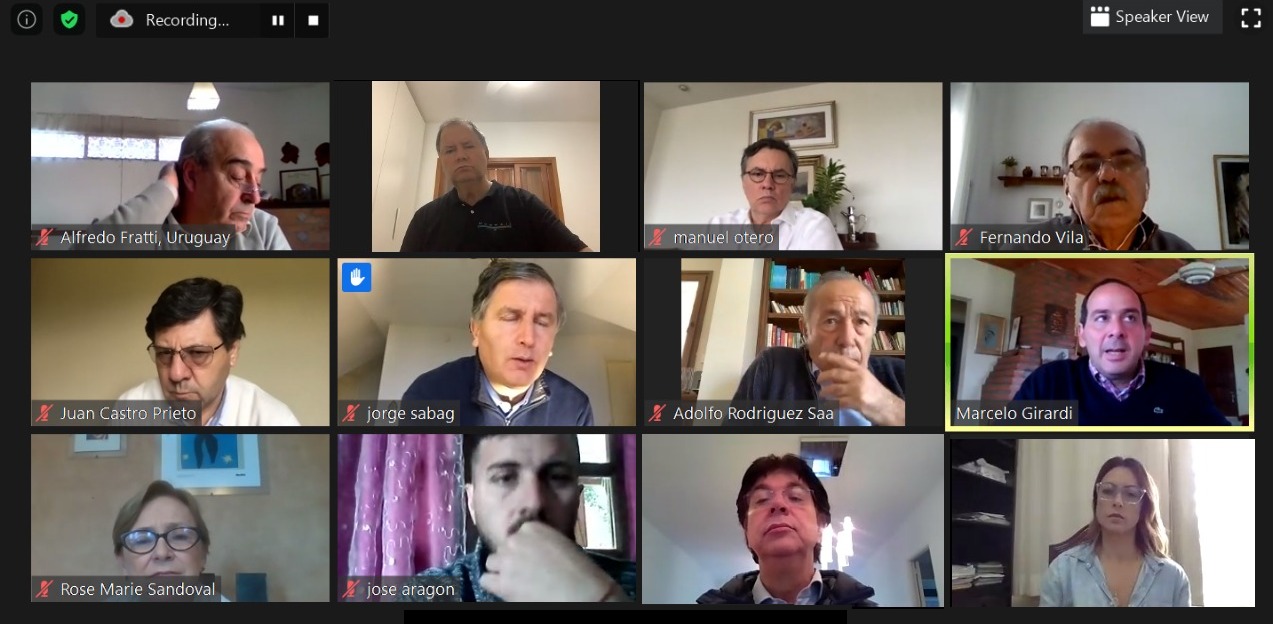The discussion took place during IICA’s II virtual forum of parliamentarians, with the participation of the Chairpersons of the Agriculture Committees in the Chambers of Deputies and Senates of Argentina, Bolivia, Brazil, Chile, Paraguay and Uruguay.

Buenos Aires, 6 July 2020 (IICA) – The Chairpersons of the Agriculture Committees in the Chambers of Deputies and Senates of Argentina, Bolivia, Brazil, Chile, Paraguay and Uruguay shared information and experiences on agricultural insurance during a virtual meeting convened by the Parliamentary Agricultural Front (FPA) of the Brazilian Congress and the Inter-American Institute for Cooperation on Agriculture (IICA).
For purposes of the discussion, Marcelo Girardi, the Secretary General of the Latin American Association for Agricultural Development (ALASA) and Fernando Vila, an International Specialist in Agricultural Insurance at IICA, presented concepts and an analysis, with a view to formulating proposals related to agricultural insurance.
Girardi discussed the evolution of insurance in various countries, pinpointing the example of Brazil in Latin America, where the Government had implemented insurance as part of its agricultural development policy, to allow small farmers to carry out production activities in a climate of stability.
The IICA expert outlined the risks, the relevant aspects to consider when designing an integrated insurance system and the challenges involved in implementation, while emphasizing strategies to distribute responsibilities in a public-private type of system to safeguard against the economic impact of different types of risks.
The forum was moderated by Brazilian member of Parliament and Chairman of the FPA, Alceu Moreira, and by the Director General of IICA, Manuel Otero.
Moreira described insurance as a mandatory and intrinsic aspect of developing a production cost structure. “It cannot be optional or discretionary”, he argued. “Financial managers should be compelled to include insurance. Family Farming needs the wholehearted support of the State”.
The Parliamentarian also called for the establishment of a Parliamentary Agricultural Front of the Americas, to provide an institutional structure to facilitate exchange among Parliamentarians in the Southern region of the hemisphere and for the design of a regulatory framework for the group of nations.
On the other hand, the Director General of IICA, stressed the importance of protecting agricultural families, who bear the main responsibility of supplying food to domestic markets. “Having insurance is essential to the stability of agricultural production”, he said. “We have to link it to credit and to have State policies to protect production”.
Peri-urban agriculture and sustainable management of water resources were two of the topics that the legislators proposed for future meetings.
Participants
In addition to Director General Manuel Otero, the IICA Representative in Argentina and Special Affairs Coordinator for the Southern Region, Caio Rocha, also participated in the meeting on behalf of IICA.
The Representatives and Senators in attendance were:
- Argentina: José Arnaldo Ruiz Aragón of the Agriculture and Livestock Commission of the Chamber of Deputies of the Nation and Adolfo Rodríguez Saá of the Commission on Agriculture, Livestock and Fisheries of the Senate of the Nation.
- Bolivia: Rose Marie Sandoval Farfán of the Plural Economy, Production and Industry Commission of the Chamber of Deputies.
- Brazil: Alceu Moreira, Chairman of the Parliamentary Agricultural Front (FPA); Fausto Pinato, Commission on Agriculture, Livestock, Supply and Rural Development of the Chamber of Deputies and Soraya Thronicke of the Agriculture and Agrarian Reform Commission of the Federal Senate.
- Chile: Jorge Sabag Villalobos of the Commission on Agriculture, Forestry and Rural Development of the Chamber of Deputies and Juan Castro Prieto of the Agriculture Commission of the Senate of the Nation.
- Paraguay: Fidel Zavala of the Senate Commission on Agrarian Reform and Rural Well-being
- Uruguay: Luis Alfredo Fratti of the Commission on Livestock, Agriculture and Fisheries of the Chamber of Representatives
More information:
Institutional Communication Division
comunicacion.institucional@iica.int











